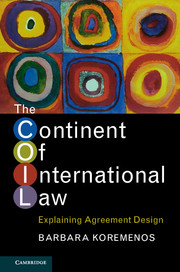Book contents
- Frontmatter
- Dedication
- Contents
- List of figures
- List of tables
- Acknowledgments
- 1 (Re)discovering the continent
- Part I COIL's building blocks: theory and data
- 2 Theoretical framework
- 3 The COIL sample
- Part II Flexibility provisions in the design of international law
- Part III Centralization, scope, and control provisions in the design of international law
- Appendix 1 List of agreements in COIL sample
- Appendix 2 Coding rules
- Appendix 3 Selection issues in international cooperation data sets
- References
- Index
2 - Theoretical framework
from Part I - COIL's building blocks: theory and data
Published online by Cambridge University Press: 05 June 2016
- Frontmatter
- Dedication
- Contents
- List of figures
- List of tables
- Acknowledgments
- 1 (Re)discovering the continent
- Part I COIL's building blocks: theory and data
- 2 Theoretical framework
- 3 The COIL sample
- Part II Flexibility provisions in the design of international law
- Part III Centralization, scope, and control provisions in the design of international law
- Appendix 1 List of agreements in COIL sample
- Appendix 2 Coding rules
- Appendix 3 Selection issues in international cooperation data sets
- References
- Index
Summary
There is little room for trust among states. Although the level of fear varies across time and space, it can never be reduced to a trivial level. … States are often reluctant to enter into cooperative agreements for fear that the other side will cheat on the agreement and gain a relative advantage.
(Mearsheimer 1994–5: 11, 13)Trust but verify.
(President Reagan's oft-repeated phrase when negotiating arms control cooperation with General Secretary Gorbachev)There is no doubt that cooperation problems such as incentives to cheat, uncertainty about other states’ true intentions, and struggles for power pervade the international system. States have different, often dramatically divergent, interests and seek advantage over one another. States also want to capture the benefits of cooperation, but, as the Mearsheimer quote makes clear, the obstacles (what I call “cooperation problems”) are severe.
This book argues that international law can solve these kinds of problems. More to the point, the fine-grained design provisions of international law, when chosen optimally, help states solve such problems in the international environment – problems that, if unheeded, could diminish international cooperation or prevent it altogether. Straightforward design provisions like on-site inspections to monitor compliance with a treaty's terms, or escape clauses to allow states to deal with unpleasant surprises, allow states to realize common interests and achieve a Pareto-improving cooperative outcome.
Still, in the words of Krasner (1991), winding up somewhere on the “Pareto frontier” can involve tough bargaining. That is, depending on the circumstances, states may fight hard over both substantive and design provisions before reaching the Pareto-improving outcome. Indeed, choosing the detailed design provisions of treaties is often a form of political interaction in which states maneuver and bargain for their interests. Why? Because international agreements and their design provisions are consequential.
COIL's basic theoretical premise is that the key to understanding international agreement design and to making comparisons across agreements, including across issue areas, is a focus on the underlying cooperation problem(s) the agreements are trying to solve and the underlying characteristics of the states involved in the cooperative endeavor – that is, properties that describe the set of actors in the aggregate. For example, some issues, like trying to ban chemical weapons or trying to encourage the rights of women, pose huge information obstacles: How can one state know what other states are doing?
- Type
- Chapter
- Information
- The Continent of International LawExplaining Agreement Design, pp. 25 - 63Publisher: Cambridge University PressPrint publication year: 2016



